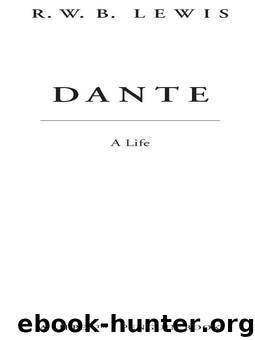Dante: A Life (PENGUIN LIVES) by Lewis R.W. B

Author:Lewis, R.W. B. [Lewis, R.W. B.]
Language: eng
Format: epub
Publisher: Penguin Group US
Published: 2009-11-24T00:00:00+00:00
He has observed the trimmers, those who never came to real life, for good or evil, Pope Celestine V among them. They are a huge throng, and Dante is astonished: “I never believed that death had undone so many” (a line that comes into modern poetry via T. S. Eliot to Hart Crane). He has come into the first circle of Hell—Limbo is its other name, an antechamber of Hell—and seen there the good pagans, those who were never baptized (he will ask about them, and the justice of their placement, in Paradise). He has noticed especially the great ancient poets, “the lords of highest song”: Homer, Horace, Ovid, Lucan. Virgil makes the fifth of these lords, and Dante is happy to record that they greeted him and made much of him, designating him as the sixth among them. The poet has seen heroes and heroines of antiquity—Electra, Aeneas, Caesar, Camilla; and the great philosophers—Socrates and Plato, and “the master of them that know,” Aristotle.
With Virgil, Dante has passed into the second circle, where the infernal torment begins, and where carnal sinners are blown about by an unresting wind. Before it sits Minos, the horrific judge, who decides where each sinner, after confessing, shall be sent for eternal punishment. In a dark, storm-swept place within the circle, two spirits approach, and Dante hears their story. The one who speaks is Francesca da Polenta, of Ravenna. She was married to the lord of Rimini but fell in love with his younger brother, Paolo; the husband caught them in the act of lovemaking, and stabbed them both to death.
Telling of this, Francesca, as it were, rehearses the Vita Nuova, with its climactic poetry of love and death. She sings of love (amor), which is so swiftly caught in the cor gentil (gentle heart) and which needs no excuse. Love, she says, led the two of them to one death: “Amor condusse noi ad una morte.” In Dante’s Tuscan, the tonal repetition of amor in the phrase una morte is itself a version of the love-death theme and of the fateful human conjunction.
Dante is passionate to know how it all happened. And Francesca:Nessun maggior dolore
che ricordarsi del tempo felice
nella miseria; ...
[There is no greater pain
than to recall a happy time
in misery.]
Download
This site does not store any files on its server. We only index and link to content provided by other sites. Please contact the content providers to delete copyright contents if any and email us, we'll remove relevant links or contents immediately.
Waking Up in Heaven: A True Story of Brokenness, Heaven, and Life Again by McVea Crystal & Tresniowski Alex(37497)
Still Foolin’ ’Em by Billy Crystal(36056)
Cecilia; Or, Memoirs of an Heiress — Volume 1 by Fanny Burney(32075)
Cecilia; Or, Memoirs of an Heiress — Volume 3 by Fanny Burney(31469)
Cecilia; Or, Memoirs of an Heiress — Volume 2 by Fanny Burney(31419)
Fanny Burney by Claire Harman(26252)
Empire of the Sikhs by Patwant Singh(22775)
We're Going to Need More Wine by Gabrielle Union(18644)
Hans Sturm: A Soldier's Odyssey on the Eastern Front by Gordon Williamson(18333)
Plagued by Fire by Paul Hendrickson(17119)
Out of India by Michael Foss(16695)
All the Missing Girls by Megan Miranda(14791)
Cat's cradle by Kurt Vonnegut(14779)
Molly's Game by Molly Bloom(13893)
Pimp by Iceberg Slim(13800)
Bombshells: Glamour Girls of a Lifetime by Sullivan Steve(13700)
Leonardo da Vinci by Walter Isaacson(12813)
4 3 2 1: A Novel by Paul Auster(11813)
The Radium Girls by Kate Moore(11636)
